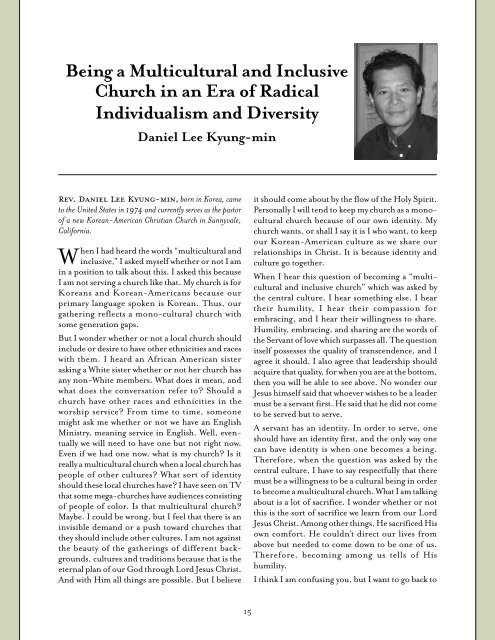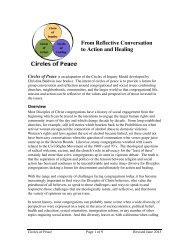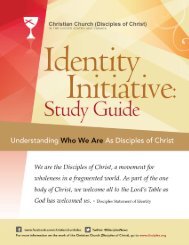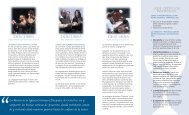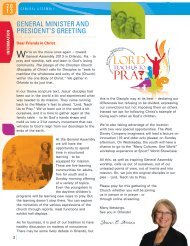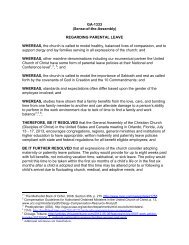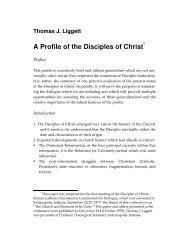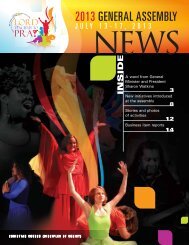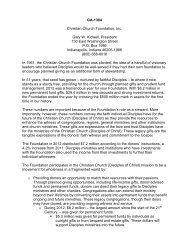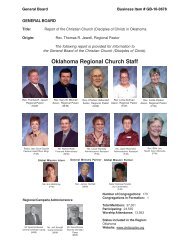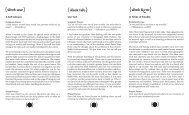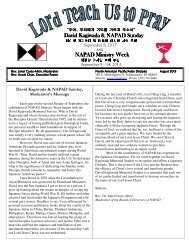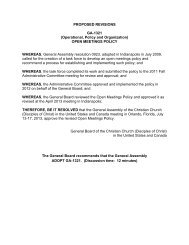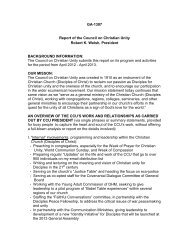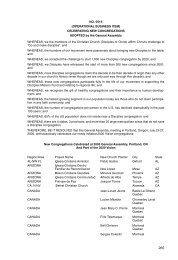RESOURCING THE CHURCH FOR ECUMENICAL MINISTRy A ...
RESOURCING THE CHURCH FOR ECUMENICAL MINISTRy A ...
RESOURCING THE CHURCH FOR ECUMENICAL MINISTRy A ...
You also want an ePaper? Increase the reach of your titles
YUMPU automatically turns print PDFs into web optimized ePapers that Google loves.
Being a Multicultural and Inclusive<br />
Church in an Era of Radical<br />
Individualism and Diversity<br />
Daniel Lee Kyung-min<br />
Rev. Daniel Lee Kyung-min, born in Korea, came<br />
to the United States in 1974 and currently serves as the pastor<br />
of a new Korean-American Christian Church in Sunnyvale,<br />
California.<br />
When I had heard the words “multicultural and<br />
inclusive,” I asked myself whether or not I am<br />
in a position to talk about this. I asked this because<br />
I am not serving a church like that. My church is for<br />
Koreans and Korean-Americans because our<br />
primary language spoken is Korean. Thus, our<br />
gathering reflects a mono-cultural church with<br />
some generation gaps.<br />
But I wonder whether or not a local church should<br />
include or desire to have other ethnicities and races<br />
with them. I heard an African American sister<br />
asking a White sister whether or not her church has<br />
any non-White members. What does it mean, and<br />
what does the conversation refer to? Should a<br />
church have other races and ethnicities in the<br />
worship service? From time to time, someone<br />
might ask me whether or not we have an English<br />
Ministry, meaning service in English. Well, eventually<br />
we will need to have one but not right now.<br />
Even if we had one now, what is my church? Is it<br />
really a multicultural church when a local church has<br />
people of other cultures? What sort of identity<br />
should these local churches have? I have seen on TV<br />
that some mega-churches have audiences consisting<br />
of people of color. Is that multicultural church?<br />
Maybe. I could be wrong, but I feel that there is an<br />
invisible demand or a push toward churches that<br />
they should include other cultures. I am not against<br />
the beauty of the gatherings of different backgrounds,<br />
cultures and traditions because that is the<br />
eternal plan of our God through Lord Jesus Christ.<br />
And with Him all things are possible. But I believe<br />
15<br />
it should come about by the flow of the Holy Spirit.<br />
Personally I will tend to keep my church as a monocultural<br />
church because of our own identity. My<br />
church wants, or shall I say it is I who want, to keep<br />
our Korean-American culture as we share our<br />
relationships in Christ. It is because identity and<br />
culture go together.<br />
When I hear this question of becoming a “multicultural<br />
and inclusive church” which was asked by<br />
the central culture, I hear something else. I hear<br />
their humility, I hear their compassion for<br />
embracing, and I hear their willingness to share.<br />
Humility, embracing, and sharing are the words of<br />
the Servant of love which surpasses all. The question<br />
itself possesses the quality of transcendence, and I<br />
agree it should. I also agree that leadership should<br />
acquire that quality, for when you are at the bottom,<br />
then you will be able to see above. No wonder our<br />
Jesus himself said that whoever wishes to be a leader<br />
must be a servant first. He said that he did not come<br />
to be served but to serve.<br />
A servant has an identity. In order to serve, one<br />
should have an identity first, and the only way one<br />
can have identity is when one becomes a being.<br />
Therefore, when the question was asked by the<br />
central culture, I have to say respectfully that there<br />
must be a willingness to be a cultural being in order<br />
to become a multicultural church. What I am talking<br />
about is a lot of sacrifice. I wonder whether or not<br />
this is the sort of sacrifice we learn from our Lord<br />
Jesus Christ. Among other things, He sacrificed His<br />
own comfort. He couldn’t direct our lives from<br />
above but needed to come down to be one of us.<br />
Therefore, becoming among us tells of His<br />
humility.<br />
I think I am confusing you, but I want to go back to


